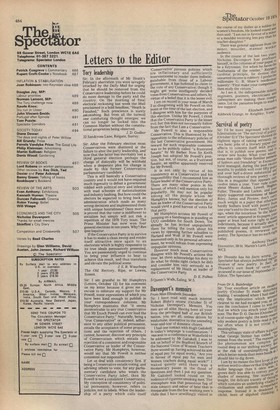Sir: I am grateful to Mr Humphrys (Letters, October 12)
for his comment on my letter because it gives me an excuse to reiterate my support for Mr Powell, some expressions of which you have been kind enough to publish in your correspondence columns. Mr Humphrys maintains that "it seems inconceivable to any true Conservative that Mr Enoch Powell can ever lead the Conservative Party." Naturally, being a "true Conservative" or, indeed, adherence to any other political persuasion, entails the acceptance of some propositions and the rejection of others. I cannot, however, discover any principle of Conservatism which entails the rejection of a consistent and responsible Conservative as leader of the Conservative Party. Mr Humphrys, however, would say that Mr Powell is neither consistent nor responsible.
Let us deal with consistency first. If being a Conservative entails voting, and advising others to vote, for any parliamentary candidate who wears the Conservative Party label, then Mr Powell is not a consistent Conservative. My conception of consistency of political persuasion, however, refers to policies, not to labels. When the leadership of a party which calls itself 'Conservative' pursues policies which are inflationary and sufficiently interventionist to render them indistinguishable from those of a Labour government, it has forfeited its claim to the vote of any Conservative; though it might get some intelligently decided votes from Conservatives and others, by virtue of a belief that it is the lesser evil.
I am on record in your issue of March 2 as disagreeing with Mr Powell on this point at the time of the last election, and I disagree with him for the purposes of this election. Unlike Mr Powell, I think that the Conservative Party is the lesser evil; but this does not necessarily follow from the fact that I am a Conservative.
Mr Powell is also a responsible Conservative. This is illustrated by his opposition to the inflationary policies of the last Conservative government. His reward for such responsible comment was to be publicly called "a frustrated fanatic" by Mr Barber. Now Sir Keith Joseph has adopted Mr Powell's position, but not, of course, as a frustrated fanatic, an epithet apparently reserved for Mr Powell.
It is not only by virtue of his consistency as a Conservative and his responsibility that I recommend him as future leader of the Conservative Party. There are many other points in his favour, of which I will mention only his popularity. He may not be popular among all the people whom Mr Humphrys knows; but the election of him as leader of the Conservative Party would yield a good harvest of votes for that party.
Mr Humphrys accuses Mr Powell of jumping on a bandwagon in standing as UUU candidate for South Down. Yet already he has invited unpopularity there for telling the truth about his views by opposing further subsidies to Harland and Wolf. If Mr Powell were interested only in his personal advancement, he would refrain from expressing unpopular opinions.
However much most Conservatives disagree with Mr Powell's actions this year, let them acknowledge his duty to do what he thinks right (which he did) and consider him very seriously as a replacement of Mr Heath as leader of the Conservative Party.
D. E. Follies 5 Queen's Walk, Ealing, W.5.


































 Previous page
Previous page